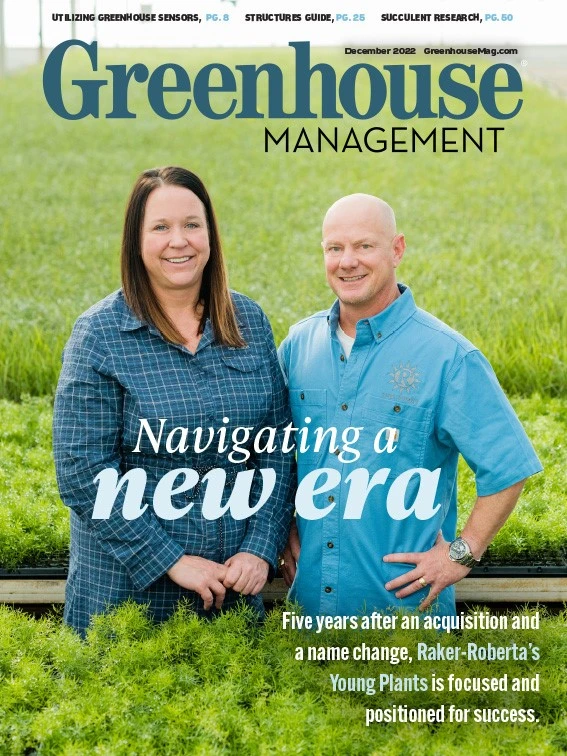

Boulevard Flower Gardens came to life the same year that Mark Landa was born, in 1955, when his parents built a small greenhouse behind their home on a busy stretch of highway south of Richmond, Virginia. Since then, the family-owned garden center has expanded, evolved and even downsized to serve customers’ changing needs through the generations.
Landa and his wife, Francine, took over the family business in 1982, diversifying from seasonal bedding plants into flowers, perennials and nursery stock. The operation grew through the decades, eventually outgrowing the original one-acre retail space surrounding Landa’s childhood home. In 2007, they built a new 33,000-square-foot facility just 3 1/2 miles away, on the site of their production greenhouses. But when the economy took a downturn, the expenses of the new building quickly eclipsed declining sales.
In 2016, Landa sold some of the property to a neighboring car dealership and rebuilt the garden center in a smaller 6,000-square-foot double-greenhouse, right next to the production facilities. His daughters, Madison Landa Williams and Casey Landa, who joined the business as co-owners around that time, helped design the new facility to be rightsized for the future.
[Our sister publication, Garden Center magazine, interviewed Landa and his daughters about this move for a 2018 cover story. Read it here: bit.ly/Boulevard-Flower-Gardens]
As senior grower, Landa navigated this change as an opportunity to strengthen and streamline the growing operation.

Rethinking inventory
Although the new facility reduced Boulevard’s retail footprint, the production space remained mostly unchanged. However, the move provided an opportunity to rethink what and how they were growing to make the most efficient use of their space.
Today, Landa manages three acres of production, half of which is under cover. With some part-time help from the retail staff, his production team of six employees grows annuals, perennials, hanging baskets, vegetables, herbs and seasonal color like mums and poinsettias. With a huge selection of hard-to-find plants, Boulevard aims to supply varieties that customers can’t find at other stores.
“Although it needs to be a diverse selection, we don’t need huge quantities of these items,” Landa says. “We concentrate on new plants and varieties that are coming onto the market. The best advice I can give other growers is to keep up with new introductions.”
Trial gardens surround the retail facility, with more beds added every year, giving Landa plenty of space to experiment with unique plants. Every spring, he hosts classes to highlight new varieties for customers — one features flowers like the pollinator-friendly Zizia, and another one showcases vegetables like the popular climbing Rapunzel tomato.
However, to make room for these specialty plants in the greenhouse, Landa had to reduce the quantities of other crops — cutting out some, like geraniums, while outsourcing others, like Gerbera daisies, to nearby growers. He listened closely to customer preferences, leveraging his daughters’ insights from the retail side of the business to guide these inventory decisions.
“We had to take a good look at it, and my daughters came in with a different, younger set of eyes and said, ‘That’s not really what the customer wants anymore,’” Landa says. “OK, let’s do something different. Let’s get rid of the ones that we can’t grow as economically, so we can do other crops instead.”


Updating production
While finetuning the crop mix at Boulevard, Landa also reevaluated his growing methods. As labor became harder to find, he looked to automate some of the time-intensive tasks like watering plants and applying pesticides.
“We tried to make some improvements to modernize and streamline things,” Landa says. “We brought all our ebb and flood benches up to date with new coverings, pumps and piping. This really helped with the labor-intensity of the crops. We also updated our spraying methods and brought in two Dramm Autofog sprayers to help cut down on spray labor and pesticide exposure.”
Pesticide use has been a growing concern for Boulevard’s retail customers, who are increasingly interested in growing their own food and providing pollinator-friendly habitats. Driven by this trend, Boulevard began using beneficial insects to help control greenhouse pests. While Landa doesn’t expect to entirely eliminate pesticide applications, he says this approach has helped reduce the use of chemicals, “especially the harsher chemicals,” he says. “We’re trying to use more of the natural sprays and botanical fungicides that are easier on the beneficials.”
As Boulevard continues to adapt and evolve to these changes in the industry, Landa is bullish about the company’s outlook as his daughters guide the family business into the third generation. “The future is bright here at Boulevard Flower Gardens,” he says. “We’re fortunate to have my daughters in management, and it makes an enormous difference seeing their skills develop and their ideas being implemented. It makes me feel good to see that what they’re doing is working.”

Explore the December 2022 Issue
Check out more from this issue and find your next story to read.
Latest from Greenhouse Management
- Anthura acquires Bromelia assets from Corn. Bak in Netherlands
- Top 10 stories for National Poinsettia Day
- Langendoen Mechanical hosts open house to showcase new greenhouse build
- Conor Foy joins EHR's national sales team
- Pantone announces its 2026 Color of the Year
- Syngenta granted federal registration for Trefinti nematicide/fungicide in ornamental market
- A legacy of influence
- HILA 2025 video highlights: John Gaydos of Proven Winners





